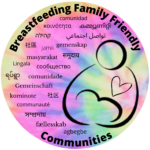Become A Breastfeeding Family Friendly Community!
The Ten Steps to successful breastfeeding recently were revised by UNICEF and the World Health Organization (WHO): Coordinate discharge so that parents and their infants have timely access to ongoing support and care (UNICEF/WHO, Revised BFHI 2018).
Ongoing breastfeeding support and care is a focus of the Breastfeeding Family Friendly Communities. Step 10, of all of the Ten Steps, has not achieved full implementation in a wide variety of settings, although many options are suggested, including…regular outreach by the maternity staff especially in the first days postpartum, referral to community-based primary health care centres with specialized training, hotlines. Facility-based personnel may simply not have the skills for community mobilization. In addition, often there is reliance on volunteers, so it is necessary to have regular refreshers and support activities for ongoing motivation and communication. Perhaps of most relevance to reaching the most vulnerable populations is the reality that most deliveries in developing countries occur in the communities and even the initial baby-friendly care may not be in place (Excerpt from Section 1.5: Baby-Friendly Expansion and Integration Possibilities UNICEF/WHO BFHI Section 1: Background and Implementation 2009 pp 53-54).
WHAT is the Breastfeeding Family Friendly Community (BFFC) Designation?
The BREASTFEEDING FAMILY FRIENDLY COMMUNITY (BFFC) DESIGNATION is a program designed to complement the Global Revised, Updated and Expanded Baby-friendly Hospital Initiative. [Note: the BFFCD team for this pilot includes the Carolina Global Breastfeeding Institute (CGBI), local La Leche League (LLL), Chapel Hill Rotary, Chamber of Commerce, Office of the Mayors of Chapel Hill and Carrboro, Orange County Department of Health, Interfaith Council, local school districts, NCBC and faith-based groups. The School Boards will also be invited to participate.]
WHY have a designation for breastfeeding?
Breastfeeding, especially exclusive breastfeeding, is associated with lower rates of obesity, diabetes, infectious diseases, and other child illnesses, as well as less maternal breast and ovarian cancers, diabetes and a faster recovery from childbirth as compared to formula feeding. Breastfeeding is also associated with overall a better chance for lifelong health and development, as well as better school performance and other achievements. In addition, exclusive breastfeeding has been referred to as “The Great Equalizer”, because (it) “goes a long way toward canceling out the health difference between being born into poverty or being born into affluence” (JP Grant, when UNICEF Executive Director). A breastfeeding-friendly community is a healthier, more welcoming community for young families of all races and ethnicities. Read More…
Learn More about bringing the Breastfeeding Family Friendly Initiatives to your community
Explore how communities can support the lactation goals of families in all areas of community life. We offer information about a number of different topics, listed below. Please contact us, if you would like information about other topics.
- Building a Community
- Businesses
- Childcare
- Community Non-Profit
- Community Centers
- First Responders
- Food Pantries
- Health Care
- International Code of Marketing of Breast-milk Substitutes
- K-16 Schools
- Lactation Support Providers
- Places of Worship
- Policy
- Proclamation
- Public Libraries
- Government
- Templates
- Trainings
Our vision is to create communities where parents, families, and babies can live full and healthy lives by leveraging their expertise and transforming systems. Breastfeeding Family Friendly Communities is an initiative that aims to promote policy, system, and environmental changes to support breast/chestfeeding families, especially historically marginalized Black and Brown families. We believe that an equity lens is vital to carrying out all components of the initiative.
We hope that communities will use the Ten Steps to a Breastfeeding Family Friendly Community as a tool to create a more breastfeeding, chestfeeding, and human milk feeding-friendly environment. Our measure fosters continuity of care through pregnancy and birth to the family’s intended time to wean by building awareness of the community’s role in supporting families, eliminating disparities, and providing measures and approaches to build a welcoming environment for all families.
We are unapologetically committed to racial and gender equity and work within each community to transform the culture of the community to normalize chest/breastfeeding by increasing connections between existing parts of the community and elevating the work of historically marginalized community members with the voices of Black and Brown lactating parents at the center of our thinking.
Our goal is to provide you with resources and next steps to make sustainable changes to the breast/chestfeeding and human milk feeding landscape in your community. We also offer technical assistance and capacity building services
Contact us for more information: contact@breastfeedingcommunities.org
